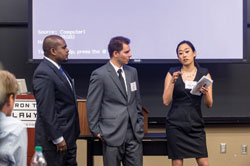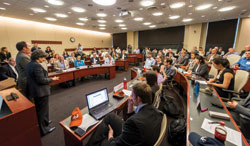At Iron Tech, students bring tech answers to legal issues

Photos by John Harrington
We can debate the need for law schools to teach the practice of law, but there might be more in store for the profession, with law students changing how it’s done. They’re developing legal technology to either help consumers and their nonlawyer advocates who might need legal services or to assist lawyers in doing that work more easily—or both.
In a course launched last year at the Georgetown Law Center in Washington, D.C., “Technology, Innovation & Law Practice: An Experiential Seminar,” students get in-depth knowledge in particular practice areas, learning the nuts and bolts of the law and then transferring that expertise into the bits and bytes of online legal resources. And they presented their final projects in the Iron Tech Lawyer Competition—Access to Justice Edition.

There was standing room only in April at an 85-seat classroom for competition among eight teams, small groups comprising the 23-member class, working on software applications to meet the needs of particular clients. The clientele ranged from the District of Columbia Bar (pro bono bankruptcy triage/intake) to the Judicial Counsel of California Administrative Office of the Courts (criminal record expungement).
“The students are actually developing the apps, and at the same time it’s a rigorous learning experience in the law, and this is giving them a new skill set for their careers,” says Richard Granat, Palm Beach Gardens, Fla.-based co-chair of the ABA Law Practice Management Section’s eLawyering Task Force. The apps mostly concern triage and intake; and in a significant change this year, the three-student teams (for mathematical reasons, one had only two) worked directly with client organizations that had heard of last year’s competition and asked for help. The students had varied experience with software development, if any.
The teams used Neota Logic applications that help the unskilled at programming to create webpages, with decision trees to process information and issue “reports” that can be used by consumers, their advocates or lawyers.
For each mouse click by a consumer or intake adviser, the law students worked out all the legal possibilities to determine where the next click goes. They learn the law in an organic way by programming it into a legal tool.
PROGRAM PAYS OFF

“I like to call the students legal architects,” says Tanina Rostain, their professor. Indeed, one of her students last year, Dustin Robinson, landed a job in the Chicago office of Seyfarth Shaw as an associate legal solutions architect, working on technological innovations for the firm’s clients and lawyers.
At the April competition, a panel of experts chose winners in three categories: presentation (won by a team doing minimum-wage and overtime calculations); design (for a Supplemental Nutrition Assistance Program eligibility/benefits calculator); and best overall (a triage/intake app for the D.C. Bar’s pro bono bankruptcy efforts).
Answering a judge’s question after the bankruptcy presentation, Georgetown 2L Jung Hwa Song explained that intake usually takes an hour and 70 percent of the bar’s pro bono clients don’t require the full process. The app, she says, frees up attorneys so they have “more time to use their core competency: legal advice.”
A growing number of America’s law schools provide similar opportunities for deeper understanding of how legal technology affects legal practice. Legal services are being reshaped. Georgetown is adding a class on regulatory agencies (many are within walking distance) and one for routine police work and crime investigation.
The ABA House of Delegates recently adopted a comment to the competence section of the Model Rules of Professional Conduct, saying lawyers should “keep abreast of changes in the law and its practice,” including “relevant technology.”
The tech-savvy, 72-year-old Granat puts the challenge matter-of-factly: “If you graduate without knowledge of legal technology, you’re not competent to practice law.”



